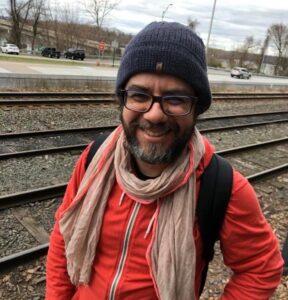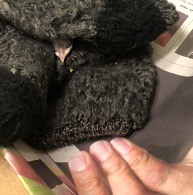
Listening to the Birds – A Pedagogy of Affection
Yesterday I was doing my walk and I found this little newborn bird on a sidewalk. She was alive and gasping for food. Her eyes were still closed and there were only few very thin feathers on her back. I was so lost I didn’t know what to do. I looked around to see if there was a nest nearby, but there were no trees or signs of any other birds around. Flies were already buzzing around his tiny body, so I took my shirt off, wrapped it around him, and brought him home. On my walk back I started searching Google to know what to do. I couldn't find any rehabilitation place to take him. I learned that wet dog food and a boiled hard egg could serve as food. I placed her in a cardboard box, got a thick winter pair of socks, and covered her body to keep her warm. I finished preparing her food and when I got it to him, he was eager (opening her mouth widely) for food. I was so happy he was eating. From six p.m. to midnight I fed him every fifteen to twenty minutes. But just before going to bed she stopped eating. This morning she wasn’t moving much or gaping for food anymore. I sang to her, I whistled to her, I tried to move her so she knew food was there for her. But to no avail. I went to check on her again and she wasn’t breathing anymore. He died.

As I did her funeral, I realized how my spirituality has changed. These recent connections with the living and the dead, the human and more than human, are throwing me into loops that have taken me into so much that is unknown and confusing. The amazing part is that the more confused I become by the presence of other beings, the more I unlearn and the more I open myself up to other forms of spirituality. The more I lose my forms of knowing, my bearings, the more strangely free I become.
I start most of my classes by opening the windows and asking my students to listen to the birds. If we can’t listen to the birds, we simply can’t listen to what we often call “ourselves,” that is, a discrete form of an individual being. The need to listen to the birds is to listen to our own songs. For we are never autonomous individuals but inter-relational ones, living in what Thich Nhat Hanh calls interbeing. Listening to the birds is a form of spirituality that blurs what might be inside and the outside.
I am searching for spiritualities where all of my senses engage other forms of life, affected by ways of paying attention to other living beings around the landscape I am a part of. I am having more trouble with forms of spiritualities that are primarily ingrained in the mind without much attention to the body, or are even the mind with the body but removed from the surroundings and relations with broader ecosystems. I am having problems with spiritualities that are more attached to buildings and things than to the fullness of life outside and the vastness of the natural worlds with its patterns, relations, connections, and complexities. Spiritualities that are attentive to a set of beliefs and practices that are disconnected from the land are becoming more difficult for me. Spiritualities that are way too human, with a God who mainly relates to humans, that is also becoming difficult to relate. I am learning to deny these forms of spiritualities while also recognizing other forms of life of the Spirit through the patch of land where I live. In other words, a spirituality where the land orients the ways of believing and being. What one might call a more enchanted form of (local) living.
The spirituality I was taught never helped me to pay attention to my landscape, to other forms of life around me, to what was underneath my feet. That spirituality made me look to the sky to search for heaven but never paid attention to birds, to the top of trees, to clouds, to rain, to stars and planets. Moreover, the theology of my spirituality taught me about class struggle but had nothing to do with nonhuman forms of life or with other species. I know how to talk about agri-business and the power of capital. I know how to set up a critique of a higher colonial class destroying the worlds of poor people. But I never learned to talk about the ways in which the poison of agribusiness fills the soil, runs to the rivers, and spreads in the fields, killing communities of people but also communities of plants, vegetation, fish, bees, and so many other living species. I never realized that the monoculture proposed by the agribusiness is the same erasure of diversity within cities, that the destruction of biodiversity is the same program that operates in jail systems.
Bees, fish, soil, plants, and animals are deeply correlated with indigenous, black, brown, and poor people and women. They must all be part of my class struggle analysis.
As I said, when I saw this newborn bird, I was lost. I grew up in São Paulo and learned to walk around beggars and animals. Stopping for a newborn bird was immensely surprising to me. In my lostness, my spirituality was challenged to relate more deeply with the breath of this little precious creature. To help this little bird is to help that living being to survive. But also, to help his bird is also to sustain the environment, the whole mutuality within the systems where s/he belonged. But most fundamental perhaps, it is to learn to see myself as part of this system, imbricated in this system, responsible for this system.
I was wondering about the natural gaping movement of that little bird, her own ancestral knowing searching for food, and the forms and movements of knowing in our classrooms. How do we search for that which keeps us alive? What is it in us that is still related to the movements of the earth that orients our gaping, our longings, and processes of mutual formation? In classrooms, perhaps teachers gape for respect and positive responses, for a place where they are seen as the ones with power holding some sort of knowledge. Perhaps students also gape for respect and positive responses but know they are there to receive knowledge. A friend pictured the classroom as a nest. I was wondering about that too. How so? Who brings the food and who gapes? Is this a one-way movement from teacher to students? Aren’t we also gaping?
We are all gaping for something. Our desires are shaped by the world we live in. Our education system is a Cartesian system becoming a neoliberal product where we are taught to gape for efficiency, for objectivity, for calculation of measures and results, for precise syllabi, for clear learning outcomes, for the ability to say that this class will fulfill items 2.1, 3.7, 4. 3, and 7.5 of the educational mission of the school and give the results (profit) promised. There is very little life in this nest. Or perhaps there is only gaping for a certain food, just like the bird needs a very specific food to survive.
I always return to Rubem Alves who said that teaching is the production of espantos: wonders and awe! I wonder about a pedagogy of affections, a pedagogy of the heart. This bird provoked a thousand espantos in me. And so much sadness. That connection affected me and changed me. Perhaps this is what I hope to do in the nests of my classrooms: find connections, be affected, and create affections; change my way, my heart, and perhaps even change the class assignments, readings, final work, and so on. I am slowly learning that classrooms are not this calculated event where students show their acquired knowledge to the teacher. It is more about the heart, and the knowledge they need to gain for themselves.
In this pedagogy of affections, I might need to continue to keep listening to the birds. Can we hear them? What are they saying, singing, uttering? So much I need to learn. But one thing I know: they are singing our songs, they are ourselves “out” there.
Leave a Reply